Migrant salary threshold fall 'would boost public sector'
- Published
- comments
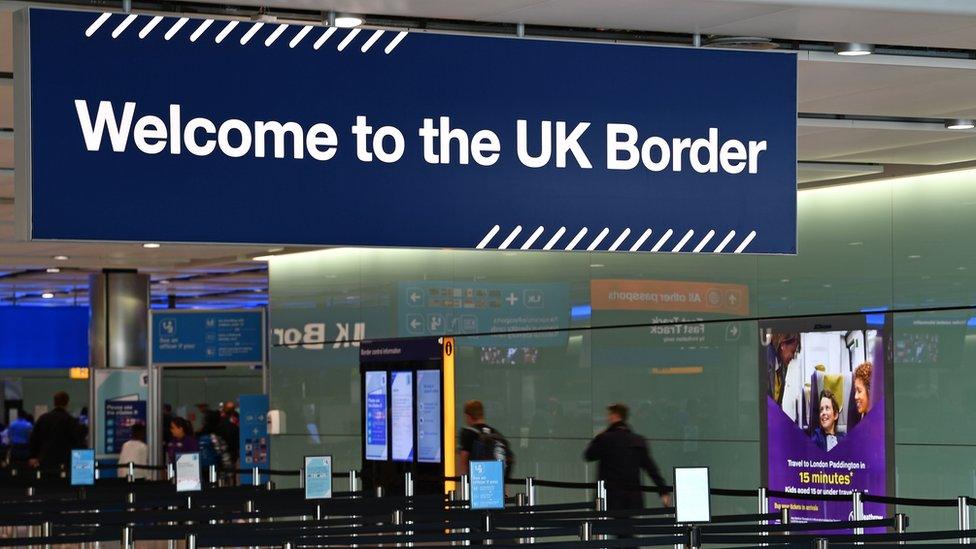
The government should drop the salary threshold for immigrants by more than £4,000, a committee has advised.
Skilled migrants from outside the EU currently need to have a job offer with a minimum salary of £30,000.
But the Migration Advisory Committee (MAC), external said it should fall to £25,600 for all workers to help recruit teachers and skilled NHS staff.
The committee's chair also called Boris Johnson's proposal for a new points-based immigration system a "soundbite".
Mr Johnson said he wanted a scheme, based on Australia's system, during his summer campaign to lead the Conservative Party, and he made it a key pledge during the election.
Prof Alan Manning, from the MAC, said while he recognised politicians needed "cosmetic" means of presenting complex topics to the public, it was unclear what the government meant when it had repeatedly used the phrase.
The outgoing chairman said: "No perfect system exists and there are unavoidable, difficult trade-offs."
Home Secretary Priti Patel said ministers would carefully consider the committee's recommendations but stressed the report was "advisory".
"I think it's important to recognize the British public voted for change when it came to immigration," she said. "We are committed to ensuring we have a system... that has the ability to level up across the whole of the UK in a way that immigration policy has failed for too long."
How does immigration work now?
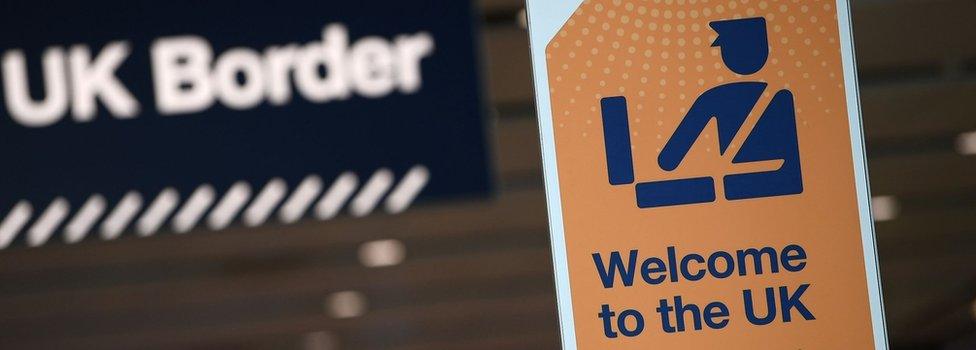
There are a range of visas in the current system
As part of the European Union, anyone from other member states - or from the European Economic Area (EEA) - can come to the UK to live or work without a visa.
For those outside the EU, there are a range of visas they can attempt to qualify for.
One of them is the Tier 1 or "exceptional talent" visa - a points based system for highly qualified people who need to be endorsed as a leader or emerging leader, but do not need a job offer - capped at 2,000 offers a year.
Another is the Tier 2 (general) visa - where the applicant has to match exact criteria, including having a job offer with a minimum salary of £30,000.
There is also a Tier 2 (general) visa with a lower salary threshold if the applicant is on the so-called Shortage Occupation List, which includes nurses and engineers.
Why was there a review of the immigration system?
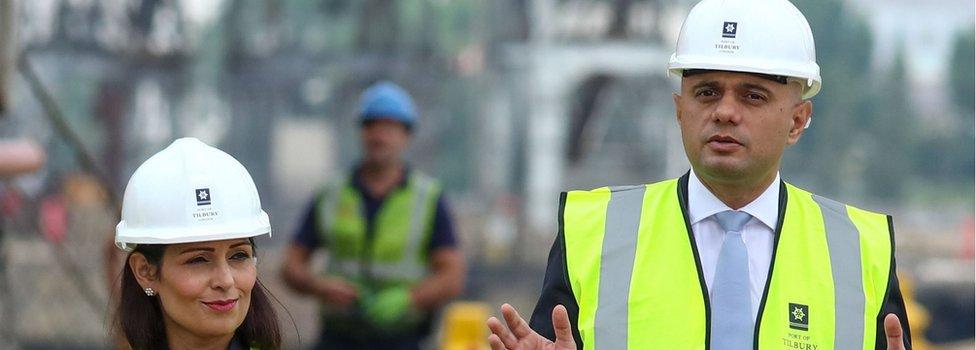
Priti Patel and Sajid Javid have both asked the MAC for reviews
Theresa May's government announced a look at changes to the immigration system based on skills in December 2018.
In June 2019, the then-home secretary (and now Chancellor) Sajid Javid said he wanted to build on this work, especially looking at salary thresholds for migrant workers.
He wrote to the MAC - an independent body that advises the government on immigration - to ask them to work with businesses to find out what next steps to take.
After Boris Johnson became prime minister, one of his main pledges was to create an overall points-based system for immigration.
This would see applicants assigned points based on a number of professional and personal characteristics, with higher points awarded for more desirable traits - from the amount of time they have worked in a skilled sector through to their proficiency in the English language.
The PM asked his new Home Secretary, Priti Patel, to also write to the MAC and seek their recommendations on implementing such a system.
What has the review said?

The MAC released the 278-page report on Tuesday
In its report, external, the committee criticised the UK's current complex immigration system.
When it came to Tier 1 visas, the committee said the rules "set too high a bar for the definition of 'exceptional talent' and is often not a route well-suited for those who satisfy the existing definition".
It recommended the government could expand this way of entering the UK, especially increasing the number of points awarded to those with the most desired skills, and focusing on younger applicants and those showing promise, rather than already being established.
For Tier 2 (general) visas, the committee said the criteria were too strict to call it a points based system as applicants have to meet every one.
However, they recommended keeping the existing framework of the visa with some changes.
For example, it thinks the government should lower the threshold for the salary needed by someone with a job offer from £30,000 to £25,600.
The committee dismissed those calling for no threshold, believing it stopped the undercutting of the labour market, ensured migrants made a net positive contribution to the public finances, and made sure migration policy supported the "ambition to make the UK a high wage, high skill, high productivity economy".
But it said the drop would enable more medium-skilled workers to qualify.
The MAC said whatever the government decides, it must work quickly to get something in place for post-Brexit immigration.
Who would the recommendations affect?
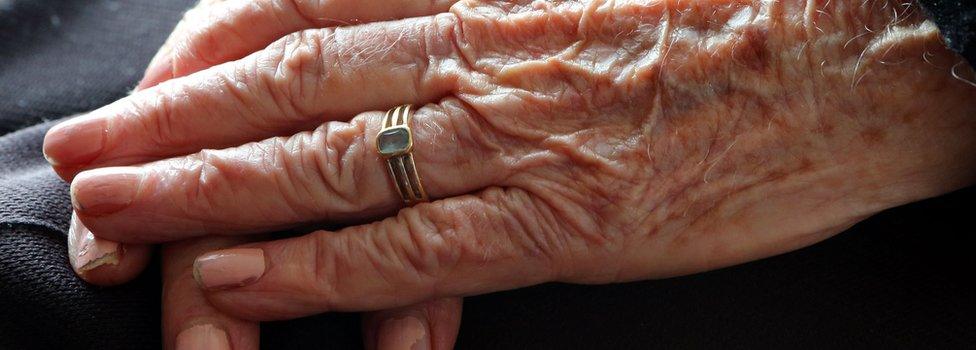
The committee warned about social care
If adopted by the government, the first people it would affect would be EU citizens.
With the UK leaving the bloc at the end of the month, and the so-called transition period - where we align with EU rules while a trade deal is negotiated - ending in December 2020, they will instead face the same hurdles as immigrants coming from outside the EU to the UK.
There would be an increase in the variety of skilled workers who could get a visa, not only because of the lower threshold, but with more additions to the skilled workers list, including carpenters, glaziers, plasterers and teaching assistants.
And the MAC said schools and the NHS would particularly benefit from the changes.
However, people who work in fishing, elementary agricultural roles or as waiting staff would be removed from the list, making it tougher for them to live and work here.
The MAC warned that while its proposals would benefit the UK economy, there could be a rise in pressures in social care because of a shortage of low-skilled workers being able to enter the country.
It said the "root of the problem" was a failure of the sector to "offer competitive terms and conditions", which itself was "caused by a failure to have a sustainable funding model".


The MAC is absolutely clear that there is no such thing as a perfect immigration system - there will be losers and winners, trade-offs that favour one part of the economy over the other in pursuit of a policy goal.
Under its recommendations, sectors like agriculture and hospitality will find it harder to bring in long-term migrants - but schools and hospitals could really benefit.
However, its outgoing chairman, Alan Manning, says government needs to be really clear with the public about what it wants from its repeated "soundbite" of an "Australian-style points-based-system".
It could mean one of many, many things, he says - and time is running out for ministers to decide.
With 11 months to go before the Brexit transition period ends, the Home Office needs to agree the policy, pass legislation and help businesses prepare for a world in which freedom of movement from the EU has ended.

What's the reaction been to the report?
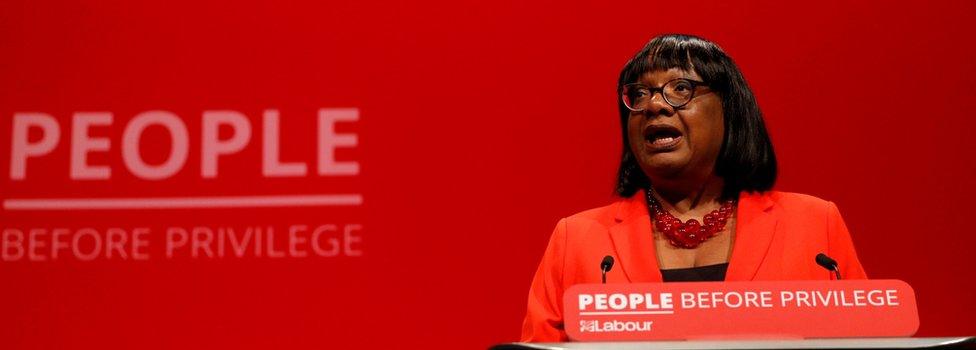
Labour's Diane Abbott says the salary cap won't help with social care
Labour's shadow home secretary, Diane Abbott said: "Even a lower salary cap won't help recruit the hospital staff we need, the social care workers or many of the new recruits to private businesses."
She added the UK needed "a system based on treating people and their families decently who come here with firm job offers, whatever their pay level".
The Liberal Democrat spokeswoman for home affairs, Christine Jardine, criticised the government's plan to end free movement after Brexit, saying the MAC review "makes clear these plans will make the crisis in social care even worse".
And the SNP called for Scotland to be able to issue its own work visas, without any salary threshold, to address the country's different economic and demographic needs.
Allow X content?
This article contains content provided by X. We ask for your permission before anything is loaded, as they may be using cookies and other technologies. You may want to read X’s cookie policy, external and privacy policy, external before accepting. To view this content choose ‘accept and continue’.

Dr Ben Greening, executive director of Migration Watch - a group which believes the present level of immigration is not sustainable - said the proposals amounted to "a significant loosening" of the rules around Tier 2 migration.
He said it would mean "exposing over seven million UK jobs to new or increased global competition from much larger developing countries where there is very substantial demand to come to the UK".
"The report essentially says the government needn't bother with a points system for people coming to the UK with a job offer and the current system relying on employer sponsorship should work fine for these people," said Denis Kierans, from Oxford University's Migration Observatory.
"It wouldn't be surprising to see a new system introduced that is branded as 'Australian-style' but actually looks rather like the 'UK-style' system we already have for non-EU citizens."